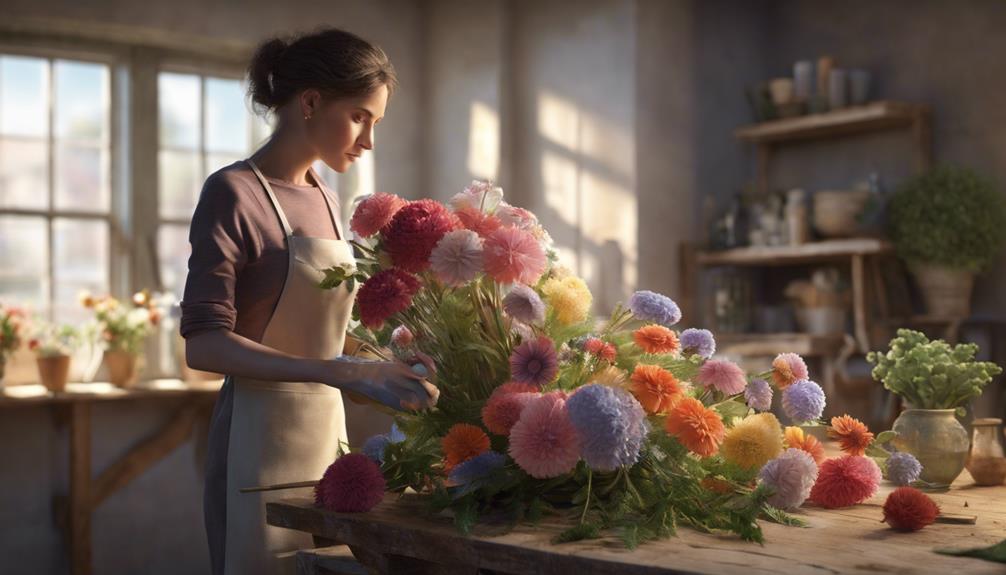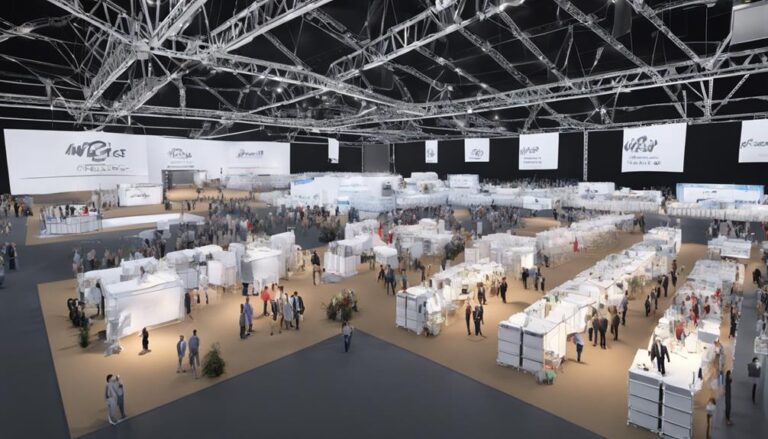Floral Designer Job Description
Floral designers merge artistic creativity with technical expertise, crafting unique arrangements and understanding color theory. Formal education in floral design or horticulture gives a competitive edge, with certificate programs focusing on techniques and degree programs on design principles. Skills include attention to detail, creativity, and time management. Daily tasks involve creating floral compositions, exploring design styles, and playing with color combinations. Career options include competitive salaries in various work environments like floral shops and luxury hotels, offering flexibility and artistic expression. Industry trends shift towards eco-friendly practices and digital marketing strategies. Learn more about this creative career path.
Key Takeaways
- Floral designers create aesthetically pleasing arrangements using design techniques.
- They must understand different design styles and elements like color theory.
- Attention to detail is crucial for meticulous placement of floral elements.
- Time management skills are essential to meet project deadlines.
- Flexibility in work hours allows for accommodating peak seasons like weddings.
Educational Requirements
When pursuing a career as a floral designer, individuals should be aware of the educational requirements that are typically expected in the industry. In this field, the debate between experience and education often arises. While hands-on experience is invaluable in honing floral design skills, formal education can provide a thorough foundation and a competitive edge in the job market. Many employers prefer candidates with a formal education in floral design, horticulture, or a related field as it demonstrates a dedication to the profession and a solid understanding of design principles and techniques.
Training options for aspiring floral designers vary, ranging from certificate programs to associate or bachelor's degrees in floral design or horticulture. Certificate programs are often shorter in duration and focus specifically on floral design techniques and practices. On the other hand, degree programs provide a more in-depth education that may include courses in plant identification, floral arrangement styles, business management, and marketing. Ultimately, the choice between experience and education depends on individual career goals and preferences.
Essential Skills
A proficiency in various design techniques, attention to detail, and creativity are essential skills for floral designers in order to excel in their craft and meet the diverse needs of clients. Creative imagination is a key skill that allows floral designers to envision unique and captivating arrangements that suit different occasions and preferences. Attention to detail is critical as it guarantees that every element of a floral design is meticulously placed, resulting in a polished and professional final product. Understanding color theory is also essential for floral designers as it enables them to create harmonious and visually appealing arrangements that evoke the desired emotions.
Furthermore, time management is crucial for floral designers to meet deadlines and deliver arrangements promptly. Effective time management skills ensure that multiple projects can be handled simultaneously without compromising on quality. By honing these essential skills, floral designers can consistently produce stunning arrangements that exceed client expectations and make a lasting impression.
Daily Responsibilities
In the daily routine of a floral designer, meticulous attention is given to creating and arranging floral compositions that align with clients' preferences and event themes. Design techniques play an important role in the daily responsibilities of a floral designer. These professionals must have a deep understanding of various design styles, such as traditional, modern, or eclectic, to meet the diverse needs of their clients. Incorporating different design elements like line, form, and texture is essential to create visually appealing arrangements that leave a lasting impression.
Color combinations are another essential aspect of a floral designer's daily tasks. Understanding the principles of color theory and how different hues complement or contrast each other is key to creating harmonious and eye-catching floral displays. By skillfully combining colors, floral designers can evoke specific moods, enhance the overall aesthetic of an event, and bring their clients' visions to life.
Career Opportunities
Exploring the field of floral design opens up a plethora of diverse and rewarding career opportunities for individuals with a passion for creativity and an eye for detail. Floral designers can find themselves in various work environments, from boutique floral shops to event planning companies, each offering unique experiences and challenges. The salary potential in the floral design industry can vary depending on factors such as location, experience, and the specific niche within the field.
- Salary Potential: Floral designers can earn a competitive salary, with the possibility of increasing their income through freelance work or owning their floral business.
- Work Environment: Opportunities exist in a range of settings, including floral shops, wedding planning companies, luxury hotels, and event management firms.
- Creativity: The career allows individuals to express their artistic flair and create stunning arrangements for diverse occasions.
- Flexibility: Floral designers often enjoy flexible work hours, especially during peak seasons like weddings and holidays.
Floral design offers a dynamic and fulfilling career path for those with a passion for creating beauty through flowers.
Industry Trends
The floral design industry is currently experiencing a shift towards sustainable practices and eco-friendly materials to meet the growing demand for environmentally conscious products and services. Floral designers are incorporating sustainable practices by using innovative designs that focus on reducing waste and promoting the use of locally sourced, seasonal blooms. This trend not only aligns with consumer preferences for eco-conscious products but also reflects a broader global movement towards sustainability.
In addition to embracing sustainable practices, floral designers are increasingly utilizing digital marketing and social media engagement to reach a wider audience and showcase their work. Platforms like Instagram and Pinterest have become essential tools for promoting floral arrangements, attracting clients, and sharing design inspiration. By leveraging social media effectively, floral designers can stay relevant in a competitive market and connect with customers on a more personal level.
Conclusion
To sum up, the role of a floral designer requires a combination of creativity, attention to detail, and a strong understanding of floral arrangements.
With the right educational background and essential skills, floral designers can create stunning floral displays for various events and occasions.
Despite the perception that floral design is a niche industry, the demand for skilled floral designers continues to grow, offering numerous career opportunities in the field.







